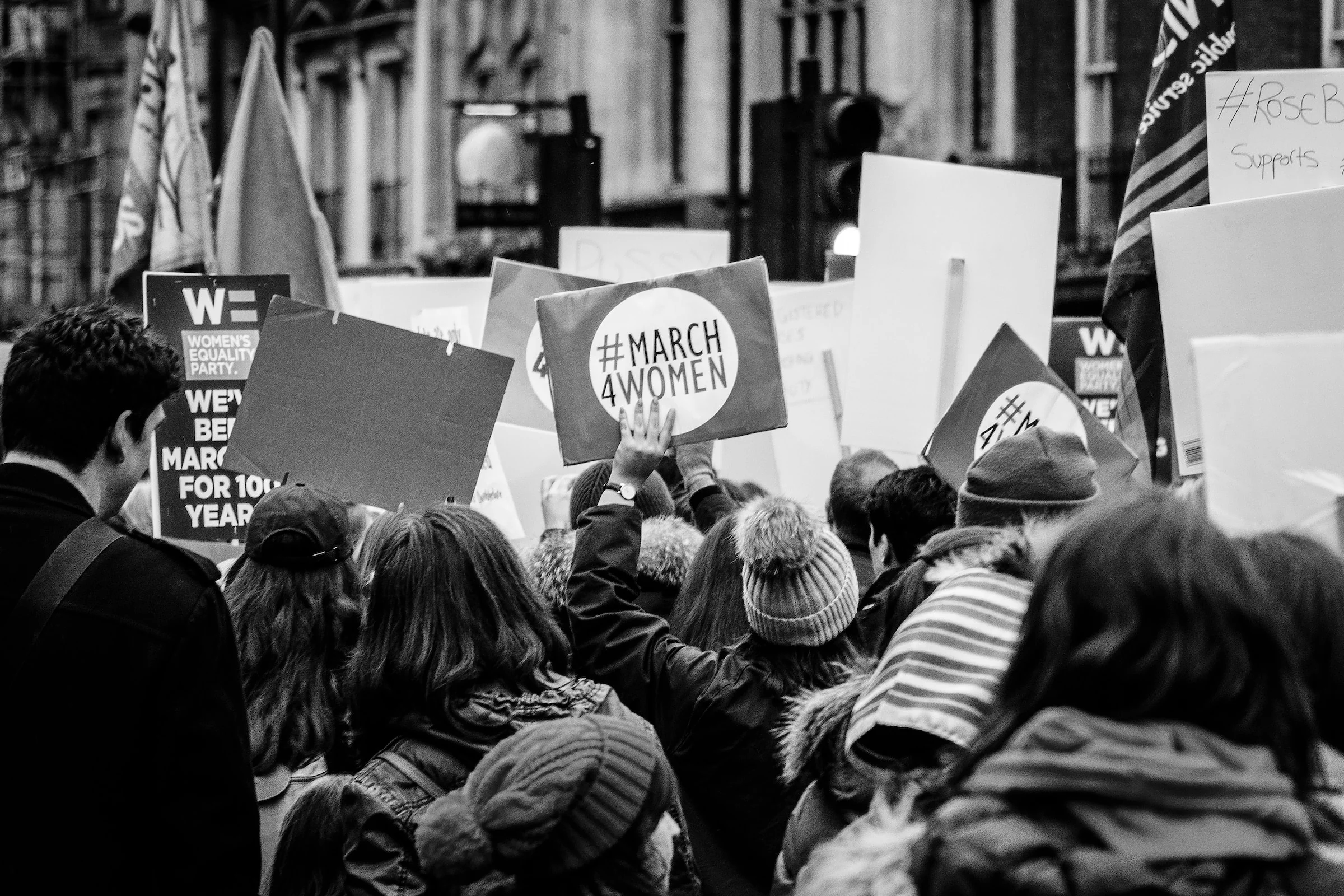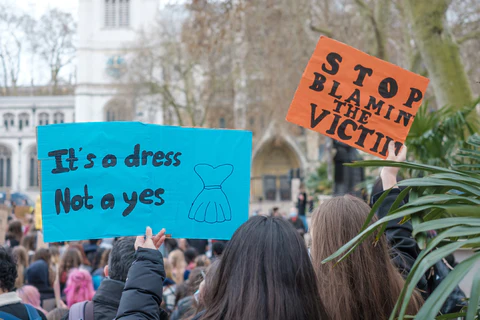Why Feminism Matters?

Feminism is an important movement that has been around for many years, and it continues to have a major impact on our society today. Feminism seeks to achieve gender equality in all areas of life, from the workplace to the home. The basic premise of feminism is that everyone should be treated equally regardless of gender or sex. This includes having access to the same opportunities, rights, and privileges as others.
At its core, feminism emphasizes that women’s rights are human rights and should not be taken away or diminished due to someone’s gender identity or sexual orientation.
This means that men should not receive preferential treatment when it comes to things like wages or promotions at work; rather, they should be judged on merit alone. Similarly, women should not face discrimination based on their gender when it comes to education or employment opportunities either; rather they too should be judged solely based on their abilities and qualifications for any given job role.
In terms of what makes feminism unique compared with other movements focused on social justice issues such as racism and homophobia is its focus on intersectionality – meaning how different forms of oppression intersect with one another in order to create an even larger oppressive system than just one form would do by itself.
For example, a woman who faces sexism may also experience racism if she belongs to a minority group; this adds up two types of oppression into one situation which can make her situation much more difficult than if she were only facing sexism alone (and vice versa).
Therefore understanding these intersections between different forms of injustice helps us recognize how each type works together in creating unequal power dynamics within society overall – something that feminist theory seeks to tackle head-on through its various campaigns and initiatives advocating for greater equality amongst genders across all walks of life.
Finally, another aspect that makes feminism distinct from other social justice movements is its emphasis on self-care – which encourages individuals (especially those belonging to traditionally marginalized groups)to prioritize taking care of themselves mentally/emotionally before focusing too much energy towards fighting against systems of inequality externally.

Self-care often looks like taking time out for yourself regularly in order to destress from challenging situations you may find yourself in due to systemic injustices; however, this does not mean completely avoiding these challenges altogether but instead approaching them holistically so as best equip oneself with adequate resources needed deal effectively with whatever external obstacles come your way – thus enabling long term success both personally professionally despite any barriers one might face along the journey towards achieving goals set out before them.
Understanding Sexism: Why Feminism is Necessary for Social Justice
When discussing the importance of feminism, it is important to understand what sexism actually means. Sexism is defined as any form of discrimination or prejudice based on gender and often results in unequal access to resources and opportunities for certain genders. It can also manifest itself through cultural norms which are detrimental to both men and women.
Sexism has been a part of our society for centuries, but its effects have been especially damaging to women due to their traditionally disadvantaged social status. Women have historically lacked access to education, employment opportunities, political power, and other basic human rights that men take for granted. This inequality makes it difficult for them to participate fully in economic development and public life which ultimately contributes towards greater economic disparities between genders in many countries around the world.
It is clear then that understanding sexism is essential if we want to achieve true social justice and equality between all genders. Feminism provides an avenue through which this can be achieved by advocating for equal rights regardless of gender identity or sex assigned at birth – something that was previously thought impossible by many people throughout history. It also works towards dismantling oppressive structures such as patriarchy which continue to exist today despite progress being made in some areas of society over recent decades. By striving towards creating a more equitable society free from sexist ideologies, feminists help ensure everyone’s right to be treated equally regardless of their gender identity or sex assigned at birth – something we should all strive towards achieving if we wish to create a fairer world where everyone has access the same resources without facing discrimination based on gender alone.
The Feminist Movement: Advocating for Gender Equality and Women’s Rights
The feminist movement is an important social and political movement advocating for gender equality and women’s rights. Throughout its history, the fight for female liberation has grown to encompass a variety of causes related to intersectionality, including those of race, class, sexuality, religion, and more. The goal of feminism is to eliminate discrimination based on sex or gender in both public and private spheres; this includes eliminating unfair pay gaps between genders as well as combating violence against women.
The concept of feminism has been around since at least the 19th century but it was not until the late 1960s that significant progress began being made in terms of obtaining legal protections from discrimination based on sex or gender. Since then, feminists have worked hard to ensure equal access to education and employment opportunities for women all over the world. Many feminists have advocated for reproductive rights such as abortion access and birth control options in order to give individuals full autonomy over their own bodies.
In recent years there has been a renewed focus on dismantling systems of oppression through collective action; this includes creating safe spaces online where people can discuss issues pertaining specifically to sexism without fear of judgment or persecution from outside sources. Many activists are also pushing back against cultural norms which perpetuate harmful stereotypes about women – such as beauty standards that privilege certain body types over others – by spreading awareness through campaigns like #MeToo and TimesUp initiatives designed specifically with empowering survivors who have experienced sexual harassment or assault in mind.
Injustice and Gender Discrimination: How Feminism Addresses These Issues
Injustice and gender discrimination are serious issues that continue to plague society. Feminism works to address these issues by striving for equality between genders, regardless of race or class. It seeks to challenge the oppressive systems that have historically held certain groups back from achieving their full potential in life. This includes dismantling structural barriers that prevent access to education, health care, employment opportunities, and other resources which are essential for success in modern-day life.
Feminism also strives for an end to the pay gap between men and women, ensuring everyone is compensated equally based on their contributions rather than any form of prejudice or bias due to gender identity or sex. It calls out instances where individuals are judged differently because they don’t fit into societal expectations surrounding masculinity or femininity, advocating instead for individual autonomy and choice when it comes to how we express ourselves as people. Feminism actively speaks out against violence against women including sexual assault – a crime often overlooked until recently – with campaigns like #MeToo bringing attention to this important cause worldwide.
Feminism supports breaking down restrictive stereotypes associated with being female such as housework being a woman’s job only; instead celebrating all forms of work whether traditionally deemed ‘male’ or ‘female’. By doing so we create more inclusive environments where everyone can thrive without feeling constrained by outdated social norms and conventions. Ultimately this helps foster greater respect between genders enabling us all to live in harmony together regardless of our differences in identity.
The Affiliation of Feminism: Intersectionality and the Fight for Inclusivity
Feminism is a movement that has been present in society for centuries, striving to promote the equal rights of women and all genders. In recent years, this fight has taken on new meaning with the term ‘intersectionality’ becoming increasingly popularized.
This concept refers to how different forms of oppression are interconnected, such as racism and sexism. It highlights the importance of working together to achieve justice for everyone regardless of their identity or background.
The goal of intersectionality is to create an inclusive environment where everyone can feel safe and secure, regardless of gender or race. By recognizing these issues within our society we are better able to provide support and resources for those who may be facing discrimination due to their gender identity or race. Intersectionality allows us all to come together as a unified front in order to take action against injustices happening around us no matter what they might be related to.
Intersectional feminism also emphasizes the need for recognition that people have intersecting identities which cannot simply be divided into individual categories like race or gender; rather they overlap with each other creating unique experiences that should not be ignored when fighting against oppression in any form – whether it be economic inequality, racial injustice or violence towards marginalized communities just name few examples. Recognizing these intersections can help foster understanding between individuals who share similar struggles yet experience them differently due to lack of privilege along one axis versus another thus helping us recognize universal human rights while unifying disparate groups under a common banner making sure every voice matters equally without regard to personal backgrounds.

Laura Bates and the Everyday Sexism Project: Raising Awareness and Inspiring Action
Laura Bates, the founder of the Everyday Sexism Project, has become a powerful advocate for feminist issues. Her platform offers an online space where people can submit their own experiences with gender-based discrimination and share stories from around the world to raise awareness of how pervasive sexism is in our society. By highlighting this injustice, she hopes to inspire collective action against it.
Bates’ efforts have made a significant impact on the fight for equality and justice – her project has amassed over 100 thousand entries since its launch in 2012, including contributions from many high-profile individuals who are speaking out about their experiences with sexism. The project also provides resources such as articles and statistics that serve to educate readers on current issues facing women today. This data serves as further evidence of why feminism is so important: it seeks to level the playing field between genders by ensuring everyone receives equal rights and opportunities regardless of sex or gender identity.
In addition to her work on the Everyday Sexism Project, Bates has written several books which aim to empower women through education about sexism, intersectional feminism, and other topics related to female empowerment. These works provide valuable insight into how we can create positive change in our societies by challenging oppressive systems that limit progress toward true equality for all genders worldwide.
Why We Need Feminism: A Call to Action for a More Equal Society
Feminism is a movement that calls for gender equality and the empowerment of all people regardless of their sex, race, or sexuality. It seeks to end discrimination against women in all aspects of life, including economic, social, and political spheres. The need for feminism has become increasingly urgent as more people are becoming aware of the disparities between genders in terms of access to education, health care services, employment opportunities, and equal pay.
The fight for gender equality is far from over. Despite numerous advances made by feminists over the years, there are still glaring inequalities between men and women across many countries around the world. Women continue to be underrepresented in leadership roles within politics and business; they often lack access to financial resources needed to launch businesses or pursue higher education; they face sexual violence at disproportionate rates compared with men; and they suffer from unequal wages when employed full-time jobs. These issues point towards an urgent need for further action on behalf of feminists if true progress toward achieving greater gender parity is going to be achieved.

It’s time we start actively challenging outdated attitudes about what it means “to be a woman” – recognizing that femininity should not equate to subjugation or inferiority.
But rather strength and power just like masculinity does not have dominion over any other groups outside itself either.
While pushing forward policies which promote fair treatment in both private sector workplaces as well as government institutions alike.
Only through these combined efforts can we hope to create a society where everyone regardless of their sex enjoys equal rights under the law as well as an equitable playing field upon which anyone can achieve success based solely on meritocracy rather than predetermined biases due solely because one identifies themselves differently than another person may do so.
To Wrap It Up
In conclusion, feminism matters because it is a vital step toward recognizing and addressing the many forms of gender inequality that still exist in our society. By focusing on issues such as the situation of women in different contexts, the fight for suffrage and equal rights, and the experiences of groups such as lesbians and young people today, we can begin to realize the full potential of our society. Even in the face of challenges such as climate change and the ongoing fallout from the Harvey Weinstein scandal, the open university of feminist activism provides a beacon of hope for those who seek a better world. So let’s continue to recognize the importance of feminism in our everyday lives, and take bold steps toward a more equitable and just society for all. And let’s remember that the fight for international women’s rights is far from over – but every step we take is a step towards a better future.
People Also Ask
Why does feminism still matter in the 21st century?
Feminism still matters in the 21st century because gender inequality continues to exist in many forms, from the gender pay gap to domestic violence. By using an intersectional feminist lens, we can take into account the context and experiences of different groups, including indigenous women, black women, trans women, and more. Feminism is not just about the right to vote or equal opportunities in the workplace; it’s about recognizing the root causes of gender inequality and working towards a world where every person is able to realize their full potential.
What is the significance of an intersectional lens in feminist activism?
An intersectional lens is crucial in feminist activism because it allows us to recognize that different groups of women face different forms of oppression and discrimination. By taking into account factors such as race, class, sexuality, and ability, we can work towards a more inclusive and equitable society. This approach was pioneered by scholars such as Kimberlé Crenshaw and bell hooks, and it has become increasingly important in the modern feminist movement.
What is the importance of Kath Woodward’s book in the current feminist discourse?
Kath Woodward’s book is an innovative and creative critique of the theories and practices of feminism, written by a mother and daughter team. It takes an intersectional lens to examine issues such as gender roles, gender-based violence, and the politics of difference, and it includes perspectives from many women who have been disproportionately affected by these issues. By disclosing their own experiences and recognizing the relevance of feminism across generations, Woodward and her co-author take an important step toward solidarity and understanding.
How has the coronavirus pandemic affected the fight for women’s rights?
The coronavirus pandemic has had a disproportionate impact on women, particularly those who work outside the home or are in low-paying jobs. It has also led to an increase in domestic violence and other forms of abuse. However, it has also highlighted the importance of feminist activism and solidarity, as women have come together to protest and demand action. The pandemic has shown us that the fight for women’s rights is far from over, but it has also demonstrated the power of community and the need to take into account the context of different groups.













